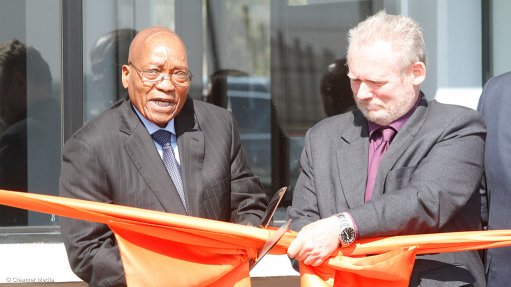
President Jacob Zuma and Trade and Industry Minister Dr Rob Davies
Photo by: Duane Daws
The 103 ha Maluti-A-Phofung Special Economic Zone (MAP-SEZ) in Harrismith, in the Free State, forms an important part of government’s SEZ Programme, which is aimed at ensuring excluded areas of the country are developed and able to contribute to the country’s economic growth.
Speaking at the launch of the SEZ on Tuesday, President Jacob Zuma said the SEZ was aimed at creating growth opportunities outside of traditional manufacturing and industrial areas.
“We are doing this by promoting industrialisation and the development of township and rural economies,” he added.
He stated that government was fully committed to pursuing and implementing a programme of “radical economic transformation”, noting that one of the critical components of achieving transformation was the notion of a balanced regional economy, together with industrial development.
“South Africa’s economy continues to rely on the regional investor hubs in Gauteng, eThekwini, the Cape Peninsula and Pietermaritzburg. These regions collectively account for 70% of the nation’s gross value-added tax (VAT),” Zuma pointed out, stating that many other regions were completely neglected, resulting in their development potential being severely constrained.
He added that many of the excluded areas lacked the critical factors for long-term economic and industrial success and that the SEZ Programme was an important catalyst that would allow excluded areas to contribute to the country’s economy.
“This launch demonstrates our promotion of industrial development, which is key to the nation’s long-term economic success and prosperity,” Zuma said.
He further noted that the SEZ, others like it and the Department of Trade and Industry's (DTI’s) broader industrial parks initiatives were critical to efforts to radically transform the economy. He also noted that, to date, the SEZ Programme has attracted over R9-billion of investment into the country.
Trade and Industry Minister Dr Rob Davies agreed that the SEZ Programme was a critical tool for attracting foreign direct investment, creating decent jobs, establishing new industrial centres, and developing and improving existing infrastructure.
He stated that the SEZ Programme had entered “full implementation phase”.
There are currently eight SEZs in South Africa and the DTI has been working with the National Treasury to improve the incentive package put on offer to attract more investors.
“This includes a 15% corporate tax for ten years, instead of the usual 28% corporate tax companies have to pay. There are also VAT and customs duties exemptions for those who invest in an SEZ,” Davies noted.
The MAP-SEZ will focus on investments in the automotive, agroprocessing logistics, information and communication technology, pharmaceuticals and general processing sectors.